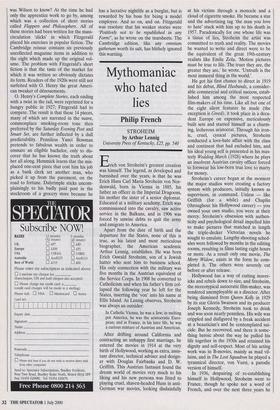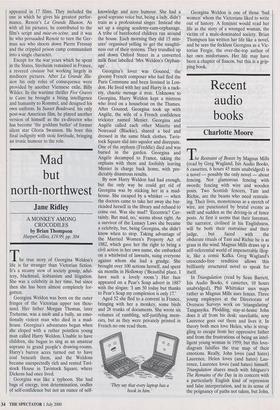Mythomaniac who hated lies
Philip French
STROHEIM by Arthur Lennig University Press of Kentucky, £25, pp. 540 Erich von Stroheim's greatest creation was himself. The legend, as developed and burnished over the years, is that he was Erich Hans Carl Maria Stroheim von Nor- denwald, born in Vienna in 1885, his father an officer in the Imperial Dragoons, his mother the sister of a senior diplomat. Educated at a military academy, Erich was commissioned into the cavalry, saw active service in the Balkans, and in 1906 was forced by unwise debts to quit the army and emigrate to America.
Apart from the date of birth and the departure for the States, none of this is true, as his latest and most meticulous biographer, the American academic Arthur Lennig, establishes. He was born Erich Oswald Stroheim, son of a Jewish hatter who sent him to business school. His only connection with the military was five months in the Austrian equivalent of the Service Corps. In 1908 he converted to Catholicism and when his father's firm col- lapsed the following year he left for the States, inserting the 'von' into his name at Ellis Island. As Lennig observes, Stroheim was always an outsider:
In Catholic Vienna, he was a Jew; in melting pot America, he was the aristocratic Euro- pean; and in France, in his later life, he was a curious mixture of Austrian and American.
After drifting around California and contracting an unhappy first marriage, he entered the movies in 1914 at the very birth of Hollywood, working as extra, assis- tant director, technical adviser and design- er with Douglas Fairbanks and D. W. Griffith. This Austrian fantasist found the dream world of movies very much to his liking and his new persona was fitted to playing cruel, shaven-headed Huns in anti- German war movies, looking disdainfully at his victims through a monocle and a cloud of cigarette smoke. He became a star and the advertising tag 'the man you love to hate' stuck with him up to his death in 1957. Paradoxically for one whose life was a tissue of lies, Stroheim the artist was committed to truth and reality. The movies he wanted to write and direct were to be the equivalent of the great 19th-century realists like Emile Zola. 'Motion pictures must be true to life. The truer they are, the greater they are,' he wrote. 'Untruth is the most immoral thing in the world.'
He got his first chance to direct in 1919 and his debut, Blind Husbands, a consider- able commercial and critical success, estab- lished him among the most respected film-makers of his time. Like all but one of the eight silent features he made (the exception is Greed), it took place in a deca- dent Europe on expensive, meticulously built sets and starred himself as a charm- ing, lecherous aristocrat. Through his iron- ic, cruel, cynical pictures, Stroheim conducted a love-hate affair with the class and continent that had excluded him, and his ideal young self is presented in his mas- terly Wedding March (1928) where he plays an insolvent Austrian cavalry officer forced to forswear his low-born true love to marry for money.
Stroheim's career began at the moment the major studios were creating a factory system with producers, initially known as supervisors, in command. Unless — like Griffith (for a while) and Chaplin (throughout his Hollywood career) — you owned your own studio, you were at their mercy. Stroheim's obsession with authen- ticity and psychological detail impelled him to make pictures that matched in length the triple-decker Victorian novels he sought to emulate. Lengthy shooting sched- ules were followed by months in the editing rooms, resulting in films lasting eight hours or more. As a result only one movie, The Merry Widow, exists in the form he com- pleted it. The others were severely cut before or after release.
Hollywood has a way of cutting maver- icks and rebels down to size, and Stroheim, the stereotypical autocratic film-maker, was rendered unemployable as a director. After being dismissed from Queen Kelly in 1929 by its star Gloria Swanson and its producer Joseph Kennedy, Stroheim took to drink and was soon nearly penniless. His wife was crippled and disfigured by a freak accident at a beautician's and he contemplated sui- cide. But he recovered, and there is some- thing heroic about the way he pulled his life together in the 1930s and retained his dignity and self-respect. Most of his acting work was in B-movies, mainly as mad vil- lains, and in The Lost Squadron he played a tyrannical director, von Vurst, a parodic version of himself.
In 1936, despairing of re-establishing himself in Hollywood, Stroheim went to France, though he spoke not a word of French, and over the next three years he appeared in 17 films. They included the one in which he gives his greatest perfor- mance, Renoir's La Grande Illusion. As with all his pictures, he contributed to the film's script and mise-en-scene, and it was he who persuaded Renoir to turn the Ger- man ace who shoots down Pierre Fresnay and the crippled prison camp commandant into a single character.
Except for the war years which he spent in the States, Stroheim remained in France, a revered cineaste but working largely in mediocre pictures. After La Grande Illu- sion his only roles of consequence were provided by another Viennese exile, Billy Wilder. In the wartime thriller Five Graves to Cairo he brought a biting intelligence and humanity to Rommel, and designed his own uniform. In Sunset Boulevard, his only post-war American film, he played another version of himself as the ex-director who has become 'the goddam butler' of former silent star Gloria Swanson. He bore this final indignity with stoic fortitude, bringing an ironic humour to the role.



























































 Previous page
Previous page